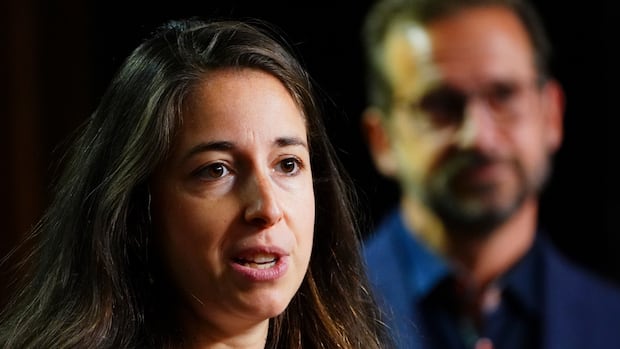The Bloc Québécois candidate for the Montreal-area riding of Terrebonne says she’s evaluating her options after a judicial recount that saw her lose by a single vote.
“Following a judicial recount that caused a vote reversal as spectacular as unexpected, I owe it to myself to evaluate all the options before us,” Nathalie Sinclair-Desgagné wrote on Facebook on Monday.
“I’ll keep you updated on the next steps.”
Sinclair-Desgagné’s statement comes as Elections Canada investigates a possible error involving an uncounted mail-in ballot from a Bloc voter in the Terrebonne riding.
Voter Emmanuelle Bossé told Radio-Canada that she mailed in her ballot in early April using an addressed envelope provided by Elections Canada, but it was returned to her as undeliverable.
Elections Canada says it appears that part of the postal code printed on the envelope was wrong and that it’s working to gather more facts about what happened.
Liberal Tatiana Auguste was declared the winner over Sinclair-Desgagné, the incumbent, by a one-vote margin after a judicial recount, in an election that returned the Liberals to power with a minority government on April 28.
Both parties declined to comment, and Sinclair-Desgagné’s statement did not specifically mention the uncounted ballot.
Auguste was initially projected to win the riding by 35 votes after the election, but Sinclair-Desgagné, who was first elected in 2021, moved ahead by 44 votes following the required post-election validation process.
The win was returned to Auguste on Saturday following the judicial recount, with Auguste receiving 23,352 votes and Sinclair-Desgagné 23,351.
Liberals fall just shy of majority
The final result brought the Liberals to 170 seats in the House of Commons, two shy of the 172 needed for a majority government. The Bloc seat count fell to 22. Other judicial recounts are ongoing.
Julie Simmons, an associate professor of political science at the University of Guelph, described the one-vote margin as “exceptionally unusual.” While the judicial recount represents the official final vote tally, she said there is still a process by which candidates or voters can apply to contest the election in court.
During a contested election proceeding, a judge can rule on the eligibility of candidates “or whether there were any other irregularities, fraud, or corrupt or illegal practices that affected the result of the election,” according to Elections Canada’s website.
While she’s not a legal expert, Simmons said there could be a “compelling” argument to be made for a contestation in this case because the vote was so close. A successful challenge would result in a byelection, she said.
A Terrebonne, Que., resident says her mail-in ballot could’ve made the difference, but it didn’t count because it was returned to the sender. There was an error in the label with the address that Elections Canada provided. Elections Canada says it’s investigating and acknowledges that the postal code printed on the envelope was wrong.
Heidi Tworek, the director of the centre for the study of democratic institutions at the University of British Columbia, said the “twists and turns” in Terrebonne show there are processes in place to ensure the vote result is as accurate and transparent as possible.
“I think the key is A, this is extremely uncommon, and B, despite it being extremely uncommon there are lots of mechanisms to ensure the vote is free and fair,” she said in a phone interview.
While “all systems and all people” can occasionally make mistakes, “the question is whether those are admitted, rectified and you have processes in place to try and prevent them as much as you possibly can, and try to learn from them so the next time you prevent any of those kind of mistakes form happening,” she said.
Richard Lacas, a resident of Terrebonne who voted in the election, said a byelection should be held to clarify the vote results. “I think all of us in the riding will be left with a doubt if ever it isn’t redone,” he said in a phone interview. “We will have a doubt on whether there were others.”
Lacas, a staunch sovereignist, voted Liberal for the first time in April because he believed the party was best-placed to stand up to the United States during the ongoing trade war. If a byelection were held, he said he’d go back to voting Bloc, as he has in previous elections, because a Liberal victory wouldn’t be enough to secure a majority.
“I wanted the Liberal Party to get in, and it’s what happened. So after that I’d come back to my old love and return to the Bloc,” he said.

